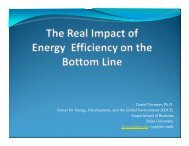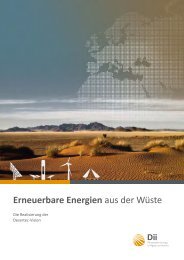Oil and gas production handbook An introduction to oil ... - ABB Group
Oil and gas production handbook An introduction to oil ... - ABB Group
Oil and gas production handbook An introduction to oil ... - ABB Group
Create successful ePaper yourself
Turn your PDF publications into a flip-book with our unique Google optimized e-Paper software.
Synthesis <strong>gas</strong> can also be created from natural <strong>gas</strong> by lean combustion or<br />
steam reforming:<br />
CH 4 + 1/2O 2 → CO + 2H 2<br />
CH 4 + H 2 O → CO + 3H 2<br />
Lean combustion<br />
Steam reforming<br />
This can be fed <strong>to</strong> the water shift reaction <strong>and</strong> <strong>to</strong> the F-T process. This<br />
process, <strong>to</strong>gether with the following application, are often called <strong>gas</strong> <strong>to</strong><br />
liquids (GTL) processes.<br />
<strong>An</strong> alternative use of the synthesis <strong>gas</strong>es (CO <strong>and</strong> H 2 ) is <strong>production</strong> of<br />
methanol <strong>and</strong> synthetic <strong>gas</strong>oline:<br />
2 H 2 + CO → CH 3 OH Methanol synthesis<br />
Then, the methanol is converted <strong>to</strong> synthetic <strong>gas</strong>oline in the Mobil process.<br />
2 CH 3 OH → CH 3 OCH 3 + H 2 O Dehydration <strong>to</strong> dimethyl ether<br />
The second stage further dehydrates the ether with ceolite catalyst <strong>to</strong> yield a<br />
synthetic <strong>gas</strong>oline with 80% carbon number 5 <strong>and</strong> above.<br />
9.1.6 Methane hydrates<br />
Methane hydrates are the most recent form of<br />
unconventional natural <strong>gas</strong> <strong>to</strong> be discovered<br />
<strong>and</strong> researched. These formations are made<br />
up of a lattice of frozen water, which forms a<br />
sort of cage around molecules of methane.<br />
Hydrates were first discovered in permafrost<br />
regions of the Arctic <strong>and</strong> have been found in<br />
most of the deepwater continental shelves<br />
tested. The methane originates from organic<br />
decay.<br />
At the sea bot<strong>to</strong>m, under high pressure <strong>and</strong> low temperatures, the hydrate is<br />
heavier than water <strong>and</strong> cannot escape. Research has revealed that this form<br />
of methane may be much more plentiful than first expected. Estimates range<br />
anywhere from 180 <strong>to</strong> over 5800 trillion scm.<br />
The US Geological Survey estimates that methane hydrates may contain<br />
more organic carbon than all the world's coal, <strong>oil</strong>, <strong>and</strong> conventional natural<br />
132

















